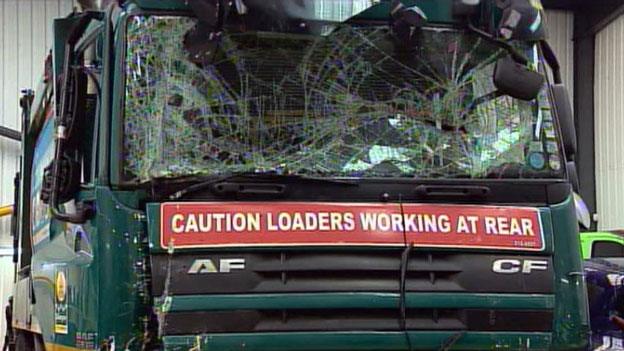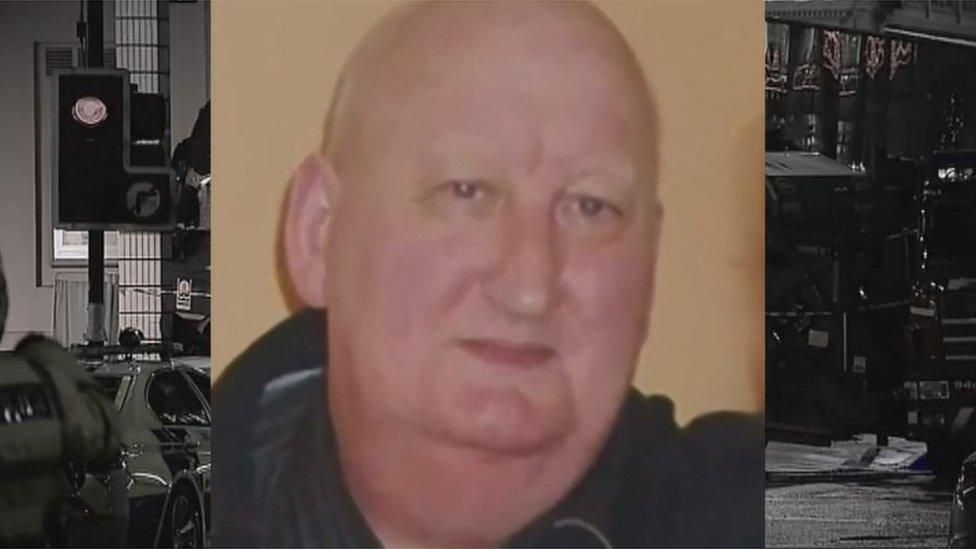Key points: The Glasgow bin lorry crash report at-a-glance
- Published

A fatal accident inquiry into the bin lorry crash in which six people died has made a series of recommendations, mainly relating to how a driver's fitness to drive is recorded.
Sheriff John Beckett said the most effective way of preventing a similar tragedy is "to avoid drivers becoming incapacitated at the wheel".
The sheriff said responsibility for this lies with drivers and the DVLA (Driver and Vehicle Licensing Agency), the UK-wide body that issues licences to drivers.
He said the current fitness-to-drive regime was a self-reporting system which was "vulnerable to the withholding and concealing of relevant information by applicants".
The sheriff said the current rules were unlikely to prevent a "deliberate deception" such as that by driver Harry Clarke, who had a history of dizziness and blackouts which were not reported to the DVLA.
Here are the main points from the sheriff's findings:

Harry Clarke's "deliberate deception" allowed to keep driving despite a history of blackouts

Government action required
Sheriff Beckett called for the UK Secretary of State for Transport to consult on how best to ensure the completeness and accuracy of the information available to DVLA in making fitness-to-drive licensing decisions.
He called for changes to the law, including increasing the penalties and prosecutions for contravention of section 94 of the Road Traffic Act 1988, external, which relates to declaring medical conditions.
The sheriff also wants a consultation on whether doctors should be given greater freedom - or an obligation - to report fitness-to-drive concerns directly to DVLA.

Weakness in DVLA rules
The sheriff said the DVLA's task was complex and difficult but there were weaknesses in the current system of self-reporting.
He called for more clarity on its "at-a-glance" guidance over "loss of consciousness/loss of or altered awareness".
The "at-a-glance" guidance should consider giving more weight to loss of consciousness if the symptoms are non-specific and also if they occur at the wheel of a vehicle.
The sheriff said the DVLA should change its policy on notification from third parties so that relevant fitness-to-drive information from reliable sources, such as the police, can be investigated whether or not it comes in written form.
DVLA should redouble its efforts to raise awareness of the implications of medical conditions for fitness-to-drive among the medical profession.

Doctors' role is vital
The sheriff said that even if the UK Parliament decided to make changes to how the DVLA establishes fitness to drive, changes to legislation could take years.
As a result, councils and other operators of large vehicles should put in place systems to make sure drivers are fit to drive on appointment, and that they remain so.
They may choose to seek independent confirmation from GPs of the accuracy of what successful applicants for employment as group 2 drivers (equivalent to the old HGV licences) tell them.
This would increase the burden on GPs and might involve duplication, so a better system should be developed.
Doctors generally should make sure medical notes are kept in a way which maximises their ability to identify repeated episodes of loss of consciousness in the case of patients who are drivers.
When a doctor is advising an organisation employing a driver as to that driver's fitness to drive following a medical incident while driving, that organisation should provide all available information about the incident to the doctor and the doctor should insist on having it prior to giving advice to the organisation and the driver.

Glasgow City Council recommendations
Glasgow City Council should not allow employment of a driver to start before references have been received, the sheriff said.
He called on the council to carry out an internal review to identify areas for improvement in relation to checking medical and sickness absence information provided by applicants.
The sheriff said the council should provide its refuse collection operators with some basic training to familiarise them with the steering and braking mechanisms of the vehicles in which they work.

More regular checks on drivers
From the age of 45, a group 2 licence only has to be renewed every five years and much could change in a driver's state of health in that time.
Annual medicals are a good idea, the sheriff said.

Technological advances
Technological advances may come to offer the most effective remedial measures to reduce harm when a driver suffers incapacitation from any cause, the sheriff said.
He said local authorities should choose large goods vehicles which have AEBS (advanced emergency braking system) fitted and should consider retro-fitting where practicable.
The sheriff said in the future a type of pedestrian protection sensor, which is available on some cars, could provide a more reliable protection than AEBS.
Again, looking to the future, some form of "facial recognition" technology could be integrated with AEBS, he said.

Route risk assessments
Sheriff Becket said the extent of the harm which may be caused by a large goods vehicle could be reduced further by careful route risk assessment, to avoid "exceptional numbers of pedestrians at particular times".

Raising awareness
In his conclusions the sheriff said: "It may well be that the single most useful outcome of this inquiry would be to raise awareness of the dangers involved in driving if subject to a medical condition which could cause the driver to lose control of a vehicle."
- Published7 December 2015
